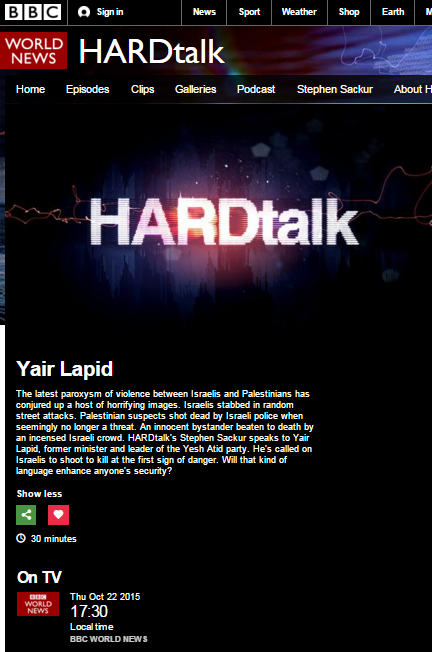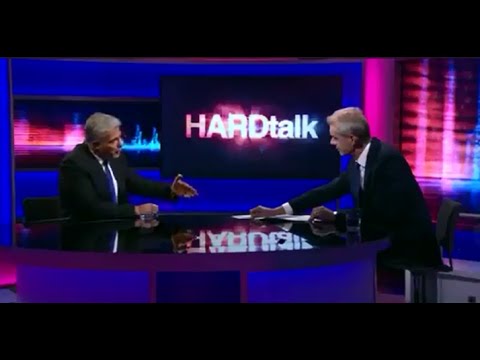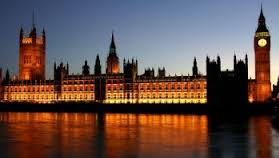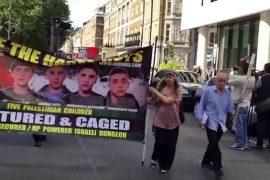Israeli MK and leader of the ‘Yesh Atid’ party Yair Lapid appeared on the BBC World News and BBC News Channel programme ‘Hardtalk‘ on October 21st. Readers in the UK can find the programme on BBC iPlayer here and a clip also appeared on the BBC News website.
Many of the questions posed by presenter Stephen Sackur during the interview provide an opportunity to look at the way in which inaccuracies, falsehoods and selective framing can be casually promoted by an interviewer.
In his introduction, Sackur frames audience views of the programme’s subject matter by depicting a wave of terror attacks carried out by Palestinians on mostly civilian Israelis as equivalent violence “between Israelis and Palestinians”, whilst portraying attacks in which people were deliberately sought out because of their ethnicity as “random” and their perpetrators as “suspects”. [all emphasis in bold added]
“The latest paroxysm of violence between Israelis and Palestinians has conjured up a host of horrifying images. Israelis stabbed in random street attacks. Palestinian suspects shot dead by Israeli police when seemingly no longer a threat. An innocent bystander beaten to death by an incensed Israeli crowd.”
In that last sentence Sackur refers – as is evident later on in the interview – to Haftom Zarhum who was killed during a terror attack at the main bus station in Be’er Sheva on October 18th. As the post-mortem showed, Zarhum’s death was actually caused by bullet wounds sustained when members of the security forces shot him after mistaking him for a second terrorist – but that does not prevent Sackur from promoting an inaccurate and context-free version of the story.
Sackur steers viewers towards a specific view of the cause of the current wave of terrorism in several ‘questions’, whilst again promoting the notions of equivalence and random attacks:
“Are you suggesting that the violence coming from the Palestinian side; that is the random stabbings we’ve seen – primarily stabbings – are you suggesting that it has nothing to do with the realities that Palestinians have to live with?”
“Of course that narrative may suit you but the Palestinians are quite clear. As Mahmoud Abbas has said, you know, ‘we are living’, he says, ‘under unbearable conditions’. And when that is the case, you get the kind of desperation – particularly amongst nihilistic young people – that results in the violence on your streets.”
Sackur manages to insert several ‘questions’ relating to a particular incident without providing viewers with a particularly important piece of context.
“Are you saying that some of the videos we have seen uploaded onto Youtube and elsewhere of Israeli police appearing to shoot in cold blood young Palestinians who appear to present no real and present threat – are you saying that those must be investigated and the police must be punished?”
“Have you seen the videos? Have you seen the killing of Fadi Aloon? You used the word justification earlier; are you saying to me that in the case of the young teen Fadi Aloon who was running toward the police, trying to get away from a mob who were baying for his blood and when the police apprehended him he ended up shot dead – are you telling me that was justified?”
Crucially, Sackur neglects to clarify to audiences that nineteen year-old Fadi Aloon had just stabbed a fifteen year-old boy when he was shot.
Sackur goes on to deliberately conflate terrorism with crime and imply Israeli institutional racism.
“But the bottom line is when people are committing crimes you don’t necessarily know whether they’re Jewish, whether they’re Muslim – whatever they are. Coming back to the words of the police chief; he says anyone who stabs a Jew is due to be killed. I mean, let’s face it; there are serious crimes in Israel that doesn’t involve Muslims. […] Do you think that the police chief would have said of a Jewish criminal that as soon as he commits any sort of crime like that he is due to be killed?”
The actual words of the Jerusalem police chief were spoken immediately following yet another terror attack – which Sackur again refrains from mentioning.
“Police said officers who ran to the scene “saw two Jewish men with stab wounds to their upper bodies. The policemen saw the terrorist with a knife in his hand and called on him to halt. The terrorist ran towards them with his weapon and the two cocked their weapons, fired at him and neutralized him.” […]
Jerusalem Police chief Moshe Edri praised the officers’ actions, and warned that anyone attacking civilians faced a similar fate.
“Policemen carried out their duties and arrived quickly. The terrorist was killed in under 90 seconds. Anyone who stabs Jews or hurts innocents — his due is to be killed,” Edri said.”
Sackur promotes the notion that Israeli politicians are to blame for “fear and anger” among the population while again inaccurately describing 29 year-old Haftom Zarhum as having been killed “by a mob” and giving a very tepid account of the terror attack in the bus station in which Sgt Omri Levy was killed:
“Did it give you any sort of pause when the young Eritrean man in Be’er Sheva was beaten to death by a mob who thought, wrongly, that he was involved in the shooting of an Israeli soldier? Did that make you wonder whether your message to the Israeli people was perhaps inflammatory and dangerous?”
“Senior politicians like you help to establish that fear and anger.”
Although he categorically states that Israelis have ‘dehumanised’ Palestinians (with no factual evidence provided for the claim), Sackur has nothing to say on the topic of whether those who shoot, stab or deliberately run over identifiably Jewish people have dehumanised their victims.
“Why do you think that – you called it a lynching – that kind of incident can happen in today’s Israel? Why is it, do you believe, that some Israelis have dehumanised the other – the Palestinians – to the point where they are prepared to engage in that sort of behavior?”
Viewers are told by Sackur that the “Palestinian leadership” (he doesn’t clarify whether that includes Hamas) is “committed” to the two-state solution.
“Of course the Palestinian leadership is committed to a search for a two-state solution. They say the problem is that Binyamin Netanyahu and his government have no intention of delivering a two-state solution and they say Netanyahu’s own words prove that because during the election campaign he made it quite plain: under his watch there would be no two-state solution.”
That very selective presentation of course fails to inform viewers that following the March 16th interview with NRG, Netanyahu later clarified his stance.
When Lapid tries to explain the significance of Jerusalem to the Jewish people, Sackur interrupts:
“Jerusalem is also the site of the third holiest religious site in all of Islam. […] Palestinians see what has happened; they see the facts of the last ten years. Used to be only hundreds of Jews every year would make the ascent up onto the top of the Haram al Sharif, Noble Sanctuary, the Temple Mount – call it what you will. Now it is thousands. They see that the Ministry of Religious Affairs in your government is now offering prayers of service guidance to people for the top of the esplanade. To Palestinians it looks as though this idea that the government of Israel will guarantee the status quo as was is no longer true.”
BBC Watch has been unable to find any factual information pertaining to that claim that the Ministry of Religious Services – as it is actually titled – “is now offering prayers of service guidance to people for the top of the esplanade”. The Israeli government, as Lapid notes, has repeatedly clarified that there is no intention of changing the status quo on Temple Mount.
Once again donning his Palestinian advocate hat, Sackur also misleads viewers on the topic of construction.
“Let’s talk about settlements too because you say, you know, what’s happening today has nothing to do with the facts on the ground but the Palestinians beg to differ and they point to the massive growth of settlement activity over the last decade. Now, most of their towns across the West Bank, ringed by Jewish settlements.”
Had Sackur consulted the BBC’s favourite Israeli newspaper, Ha’aretz, he would know that:
“In fact, since Netanyahu became prime minister in 2009, there has been less construction activity in the settlements than under any other prime minister since 1995.
According to data from the Housing and Construction Ministry, an average of 1,554 houses a year were built in the settlements from 2009 to 2014 — fewer than under any of his recent predecessors.
By comparison, the annual average was 1,881 under Ariel Sharon and 1,774 under Ehud Olmert. As for Ehud Barak, during his single full year as prime minister, in 2000, he built a whopping 5,000 homes in the settlements.”
So Sackur’s claim of “massive growth of settlement activity over the last decade” is as inaccurate and misleading as his claim that most Palestinian towns are “ringed” – i.e. surrounded – by “Jewish settlements” and that has happened within the last ten years.
During this interview, Sackur claims that Palestinian interviewees on Hardtalk are ‘challenged’.
“Believe me; we challenge the Palestinians on the language they use….”
Readers wishing to judge for themselves whether that claim is true can find several interviews with figures such as Saeb Erekat and Suha Arafat here. Notably, Erekat was not challenged when he told ‘Hardtalk’ audiences that there is such a thing as “the ’67 borders” and Stephen Sackur had nothing to say about Erekat’s claim to be “a Canaanite”.
So, while this may have been an interview with an Israeli politician, BBC audiences were also treated to selective framing, omission of relevant context and the promotion of inaccurate information which was not only materially misleading but would clearly influence their views of the subjects selected for discussion and the wider topic in general.





